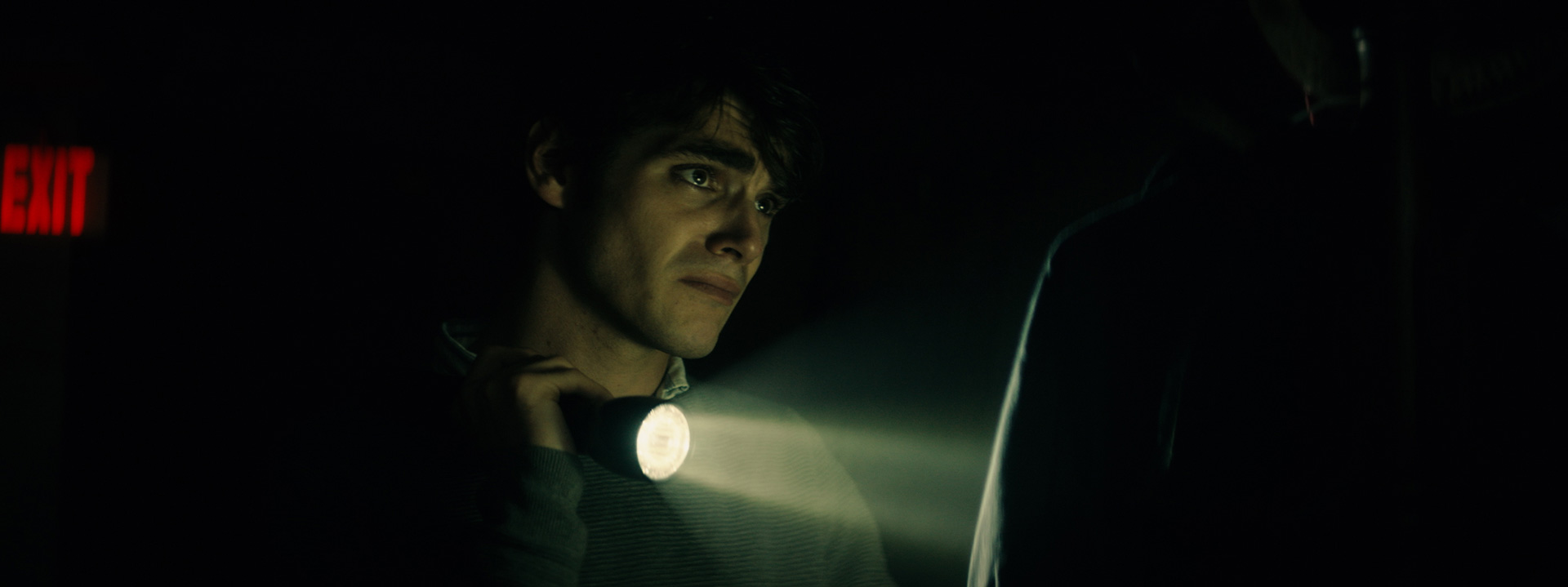It starts with a bottle of beer hitting a bar before an off-screen fight gets that glass bouncing along to the impact of bodies we never see. And it finishes with a similar still life that may or may not be the exact same beverage—a question left in limbo considering bottles are hitting bars past closing time throughout the entirety of director Cody Calahan and screenwriter Peter Genoway’s film The Oak Room. There are a lot of these almost cyclical moments during its brisk, dialogue-heavy ninety-minutes: drifters coming down the steps to greet a bartender hoping to go home, blizzard snow climbing windows, and the desire to tell stories with calculated meaning whether or not the teller or the listener knows as much once the words begin.
Along with those purposeful truths, however, come purposeful distractions. Bloodied hands presume foul play. Unopened bags carry the potential for dual identities. And flashbacks within flashbacks take us down rabbit holes of “what ifs” that our minds enjoy filling thanks to Calahan and Genoway intentionally leaving them empty. They want us to take leaps. They want us to assume the worst. And they want us to predict complex motivations where they’ve only left dumb luck coincidence. So we ask ourselves, “Who is ‘goosing’ which story?” Is it grizzled barkeep Paul (Peter Outerbridge) twisting the knife into a face from the past who owes him monetary and emotional compensation? Is it young Steve (RJ Mitte) returning to bear the brunt of that ire? Or is it the filmmakers themselves?
The answer is, “Yes.” Yes to all. Yes with intent. And yes without. Some characters know their stories because they were in the room. Some heard them second-hand. And others are just making something up to get a rise out of the person whose ear they’ve coaxed over. There’s pain in a lot of them too. Just look at Steve. He hasn’t been back to town in years—not when he flunked out of college and not to attend his late father’s (Nicholas Campbell’s Gordie) funeral. He has to confront that loss while trying his best to keep the brave façade Paul tirelessly works at chipping away in a bid to settle a score both for himself and the friend he was forced to bury alone.
There’s also an ample amount of dread in the unknown. Did Paul call a mutual acquaintance Steve fears? What happened to Gordie when he hitchhiked years ago that got him spooked weeks before his death? Who chased Richard (Martin Roach) into Michael’s (Ari Millen) bar—two characters from the yarn Steve weaves to hopefully earn forgiveness? The mysteries grow larger as we learn every chapter of this tale is incomplete without its beginning or end. Violence creeps into darkened corners as a madman shrouded in shadows drives the icy highway to a destination thus far kept out of time. And both Steve and Paul glare at one another with the weight of a shared history that signifies the former’s anecdote may in fact be a warning.
Add it together and you get a well-oiled machine of intrigue and possibilities that Genoway has carefully constructed as a labyrinth Calahan’s continued visual mirroring helps bolster. With more questions than answers, we’re forever one step back even when we have everything figured out because we can’t trust that they won’t throw one more wrench to flip the table. That aforementioned pain leads into dread, but both conjure a healthy dose of humor too. Outerbridge is playing Paul with as much wizened “tough love” as he is disappointment so expect an acerbic wit to cut through the frustration of having so many memories flood back. And Mitte lends Steve a big enough chip on his shoulder to play the kind of games that deserve the old man’s constant vitriol.
The Oak Room is playing games with us as well. We throw our arms in the air when Steve gets to the end of his story only to reveal he left out its start. We hope to hear the rest only to receive Paul’s interrupting recollections meant to hit Steve hard enough to keep him off-balance if for no other reason than to remind him that things in this world matter beyond mere amusement. Things have value—the type that garners financial restitution and the type that sets into motion a gruesome means of punishment. It matters that Steve didn’t say goodbye to his father and it matters that Paul took responsibility for his funeral arrangements. If not for those things, they wouldn’t be together now.
That’s what matters most because everything originates from their mouths. They tell the stories within stories that transport us to different places to see different characters simultaneously acting in accordance to the storyteller’s whims and their own realities. The camera spins us from one bar (Paul’s) to the other (the titular establishment) as we shift perception of who’s good, bad, and unlucky with each new detail until the appearance of blood threatens plenty more. Why have things come to such a dark end? In all honesty, I wouldn’t be surprised to learn Genoway and Calahan don’t even know. It ultimately doesn’t matter. The characters know what they did and we know them confronting their guilt won’t impact their fate. The moment Steve and Paul sat down sealed it.
The Oak Room is playing as part of Fantasia International Film Festival’s 2020 online edition.

